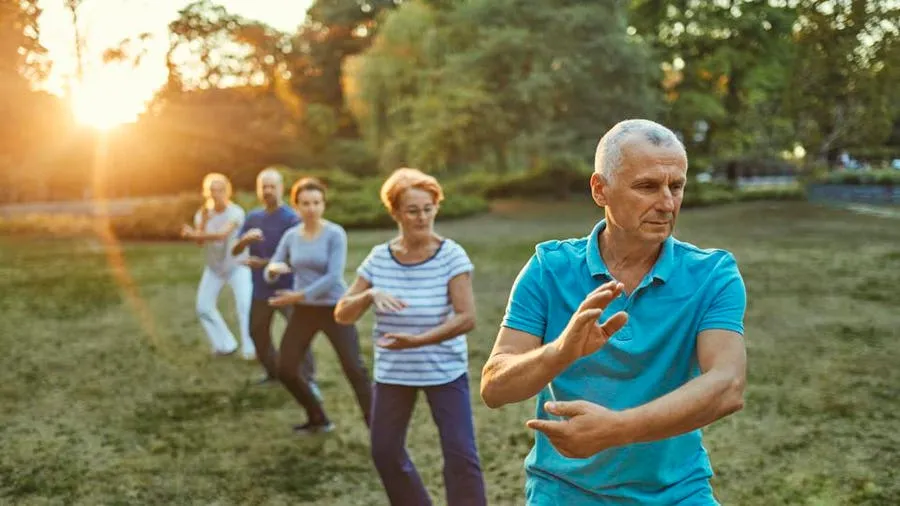Key Takeaways:
- Tai Chi is an excellent way to remain active post-menopause, offering mental and physical health benefits.
- The practice improves balance, flexibility, and mental clarity, which can diminish with age.
- Tai Chi offers a gentle approach to maintaining cardiovascular health and bone density.
- The communal aspect of Tai Chi classes also promotes emotional well-being and social interaction.
- Resources and beginner tips are available for those new to the practice.
Introduction: Embracing Tai Chi After Menopause
As women enter the post-menopausal phase, they often face a myriad of physical and emotional shifts that can impact their quality of life. For many, finding an effective and sustainable way to maintain overall wellness becomes a priority. With its roots in ancient Chinese tradition, Tai Chi emerges as a holistic approach that is as beneficial today as it was centuries ago. Understanding how it can complement post-menopausal health is essential for those new to this practice. By Starting With Tai Chi for Beginners, women can open the door to a life of enhanced vitality and balance.
Unlike high-impact workouts that can often feel daunting and stressful, Tai Chi offers a gentle yet powerful movement regimen that harmonizes the body and mind. This makes it an ideal choice for individuals seeking a balanced lifestyle tailored to meet the needs brought about by post-menopausal changes. As women navigate this unique phase, Tai Chi provides a nurturing environment that addresses physical fitness and fosters mental resilience and emotional well-being.
Physical Benefits: Strengthening and Soothing the Body
Physical health is often a primary concern for those managing life after menopause. Tai Chi is especially adept at addressing these concerns through its comprehensive approach. One of its standout benefits is its ability to support strong bones and healthy muscles. This is achieved through dynamically slow yet engaging motions that promote weight-bearing activity essential for fighting osteoporosis. These movements help maintain bone density, which is crucial as bone health becomes more fragile with age.
In addition, Tai Chi offers cardiovascular benefits without the intensity of more traditional exercises. Regular practice can increase circulation and improve heart health, vital to a vibrant lifestyle.
Mental Clarity and Stress Reduction
The journey through menopause is not only a physical one but also an emotional transformation. Many women report experiencing heightened anxiety and stress levels during and after menopause, prompting a need for effective management strategies. Tai Chi’s emphasis on slow, deliberate movements encourages practitioners to focus on their breathing and physical presence, creating an immediate calming effect.
The repeated flowing motions combined with controlled breathing bolster resilience against stress, offering a sanctuary of peace for practitioners to retreat to, even amid life’s challenges. This improvement in mental clarity and emotional stability can significantly contribute to an elevated quality of life during post-menopausal.
Improving Balance and Flexibility
Balance and flexibility naturally decline with age, yet they are essential for maintaining independence and mobility in later years. Tai Chi addresses these areas directly by emphasizing posture, coordination, and movements that safely challenge physical limits. The practice increases flexibility and promotes enhanced balance, key factors in preventing falls and ensuring a safe, active lifestyle.
The slow, deliberate nature of Tai Chi exercises teaches practitioners how to control their movements, helping to build and refine their muscular power and proprioception—the body’s sense of its spatial position. This newfound physical awareness is critical for increasing physical capability and boosting confidence levels, empowering individuals to engage more freely with their surroundings without the fear of injury. This way, Tai Chi becomes a foundation for sustaining physical and psychological strength.
Building a Community Through Tai Chi
The sense of community further amplifies the benefits of Tai Chi it fosters. Whether through group classes or online sessions, Tai Chi brings together individuals seeking health and healing, providing a shared experience and mutual support. This community aspect is crucial for emotional and social health, particularly for those who may feel isolated during post-menopausal changes.
By participating in a Tai Chi class, practitioners are improving their health and social lives. The shared experiences, companionship, and encouragement in a Tai Chi community enhance motivation and create lasting friendships. As women bond over their shared experiences of aging and wellness, they form supportive networks that transcend the practice room and enrich everyday life.
Getting Started: Advice for Beginners
Embarking on a Tai Chi journey is both accessible and fulfilling. For beginners, ample resources are available, including local classes and online tutorials, each offering structured guidance on mastering the fundamental movements. Emphasizing the basics is crucial, as proper form and technique set the groundwork for a safe and beneficial practice.
Starting slow and focusing on the essentials allows new practitioners to build a strong foundation. As confidence grows, they can progress to more complex routines and explore the art more deeply. Instruction from experienced teachers—in person or virtually—ensures a supportive environment where individuals can learn at their own pace, making it a rewarding experience tailored to personal goals and capabilities.
Incorporating Tai Chi Into Your Routine
Integrating Tai Chi into daily life doesn’t require dramatic lifestyle shifts. Its flexibility allows it to fit seamlessly into any routine, offering remarkable benefits with consistency over time. The key is commitment and making Tai Chi a regular part of the day, whether practiced for a brief morning session or as an evening wind-down.
With as little as 20 minutes a day, practitioners can experience a transformation in physical health, emotional well-being, and mental clarity. This daily practice accumulates, leading to a holistic lifestyle change that promotes long-term wellness. As Tai Chi becomes a staple in everyday life, practitioners often find a newfound harmony that enriches their entire existence, equipping them with the strength and serenity needed to thrive in their post-menopausal years.











